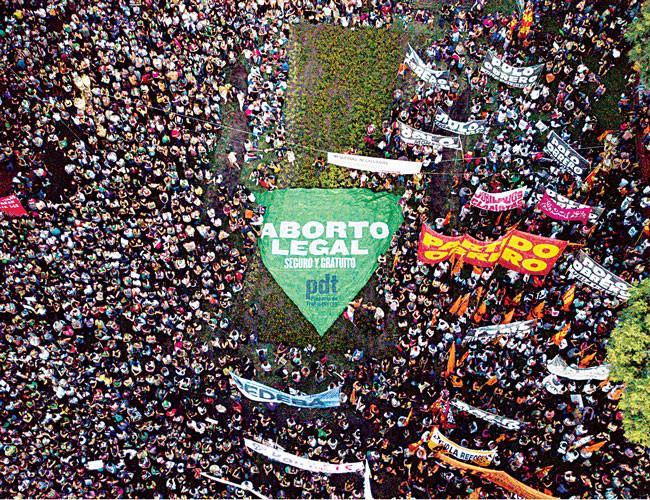Women’s Day marches fill Latin America capitals to denounce
BUENOS AIRES

Tens of thousands took to the streets of Buenos Aires and capital cities across Latin America on March 8 to mark International Women’s Day and protest against gender-based violence.
“A beautiful woman is one who marches” said one of the many placards held above the densely packed, slow-moving crowds of demonstrators in the Argentine capital.
“We have to make a lot of noise. Over here, we have to be everything, not just women. This day should be a national holiday,” said nurse Claudia Morales, accompanied by her two teenage daughters, as the throngs neared Congress.
Other women held babies in their arms or pushed strollers, while teenage girls held banners reading “My mum taught me to fight.”
The overall aim of the march was to protest violence against women, in a country of 42 million which logged 292 murders of women in 2017 -- a number that places Argentina at the lower end of the scale when it comes to “femicide” compared to other Latin American countries.
But this year, it also gained strength as a show of support for a bill to legalize abortion in the first 14 weeks of pregnancy. Terminations are currently only permitted in cases of rape or if a woman’s health is in danger.
Argentina became a regional leader in combating violence against women when the “Not one more” movement enjoyed a surge of support in 2015. Since then, activism has spread across the country.
In Mexico, where an average of 7.5 women are killed every day, thousands of protesters marched on March 8 to the iconic Angel statue in the center of the capital.
“It’s difficult to talk about it,” said Paula, a mother of five, recounting a decade of physical abuse at the hands of her former partner. “I have been through all the legal proceedings.”
I went to the police when he hit my daughter, who was nine at the time and who is his daughter too. But lawsuits need to be paid for. I have five kids with him, two of them have disabilities,” said the activist, a slight woman who speaks in a slow, deliberate manner.
The decriminalization of abortion was another rallying cry for a march that took place in El Salvador, which has some of the harshest punishments for abortion in the world.
At the front of the march was Teodora Vasquez, who in February was released after almost 11 years in jail for aggravated murder, following a stillbirth. She denied the charges against her.
“Abortion must be decriminalized because many women facing medical obstetric emergencies are accused of crimes and put in jail where they languish unjustly,” said Vasquez.
In Honduras, feminist groups demanded justice for environmental activist Berta Caceres, who was murdered two years ago in her home after years of death threats.
















